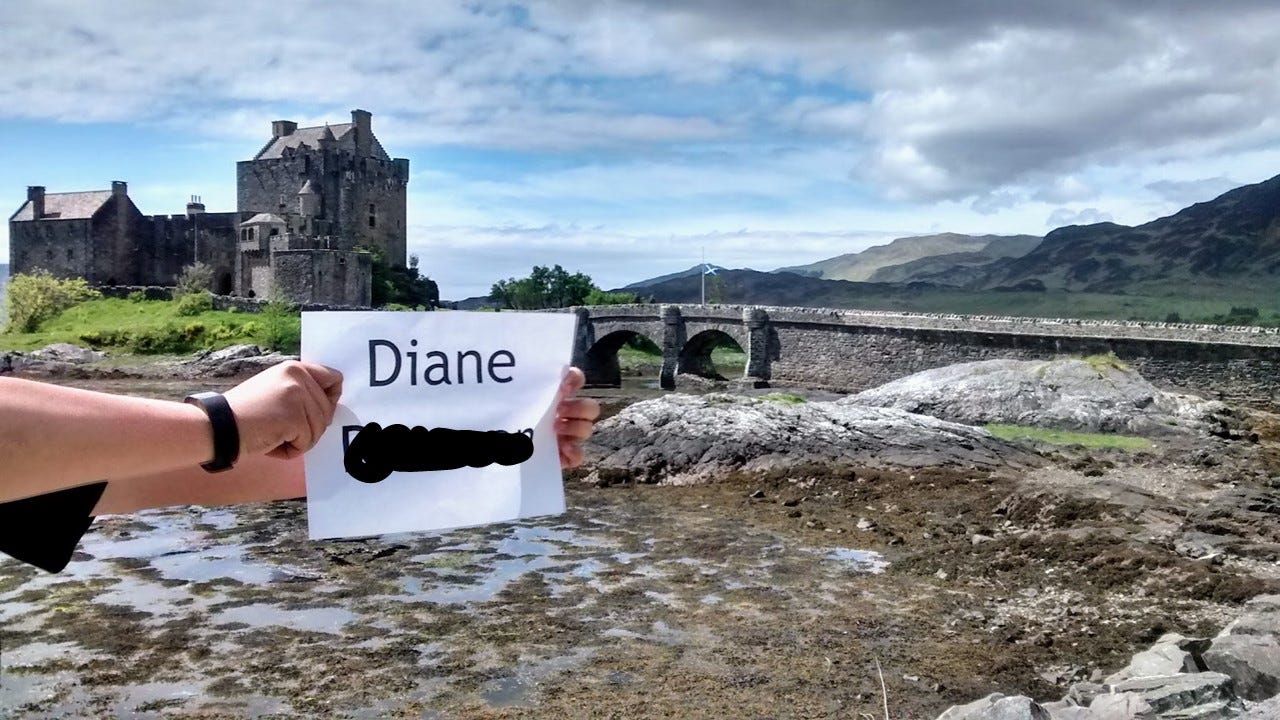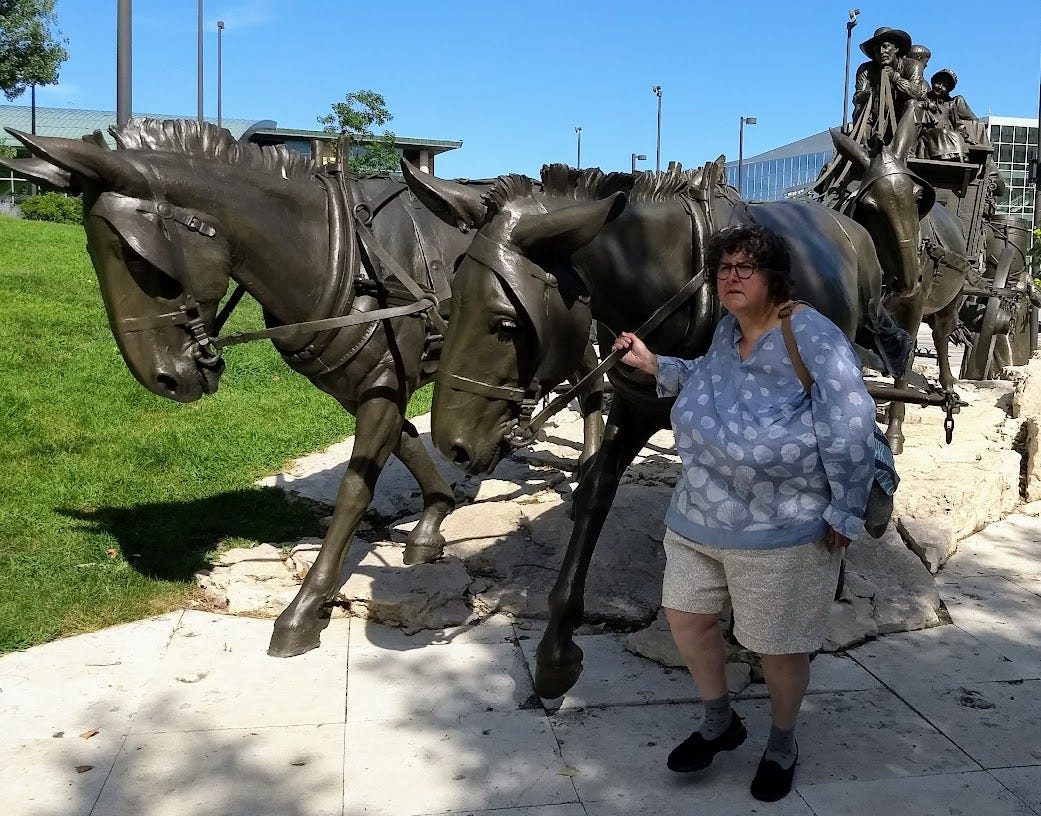Your Name In the UK. Plus an Unlikely Civil Rights Icon Speaks.
NOTE FROM NON-BORING HOUSE Your Name in Britain? Now There's an Offer! Plus More Exciting News from Non-Boring House

How Long Is This Post? About 2,000 words, or 10 minutes
A Warm Bass Note: A Visit with Virginia Durr
One of the most bothersome things about the train wreck that is history education in the US is that it leads almost everyone to think that the only history worth knowing is the dry factoids in those bloody boring massive textbooks they hand you in high school or even (shamefully) college intro classes.
That trains almost everyone to take a big sigh of relief when they survive the class, and draw a line under history, to think you know as much as you want to, or need to. Anything more is icing on the cake, anyway. Surplus. Trivia.
You know what? The trivia is what you got in those survey classes. Intro classes and their textbooks are like an off-key tune played on a recorder by a tone-deaf ten year old. Real history? A magnificent symphony orchestra, with millions of musicians, but missing or discordant notes that the conductor is always working to address. Historians are the conductor.
Let’s talk Virginia Durr.
I keep bringing up Virginia Foster Durr’s name in conversation lately. She fascinates me, and I want more people to know about her. She’s not not famous (I mean, some people have heard of her). But hardly a household name. And she’s a note in the orchestra, a confident, sensible bass note, all by herself.
Virginia Foster was a typical young white posh Southern woman, a lady from Alabama, and an unquestioning racist. In 1920 (not a typo) , she enrolled at Wellesley, a posh liberal arts college in Massachusetts, then for women only.
To deter cliquishness, the college required students to rotate seating at dinner. One day, Virginia refused to sit with a black student. The dean summoned her to her office, and gave her a pointed lecture, the upshot of which was that if Virginia wouldn’t knock off the racist behavior, she would be expelled.
This is testimony to how a few words can change a young person’s life. And the incident was a major “aha” moment for young Virginia. This was when she realized she really wasn’t in Alabama anymore, and that maybe the problem wasn’t Wellesley, but Alabama. With that realization, the world suddenly made more sense.
Virginia Foster Durr would later become a civil rights activist, and I have written about her role in the Montgomery Bus Boycott. Her work included arranging a place at activist school for the secretary of the Montgomery NAACP, a woman you might have heard of, named Rosa Parks. Virginia was a bit broke, so the tuition was paid by Virginia’s friend Jessica Mitford, British aristocrat turned radical leftist (in reaction to her Nazi sisters) who was by then living in Oakland, California.
I don’t write about Virginia Durr because she was typical of white Southern women of her age. She absolutely wasn’t. She was an extremely rare exception. She was, in fact, unique. The fact that she existed at all is what fascinates me.
And Durr’s opinions weren’t performative crap, not “Hey, look at me! I’m an anti-racist now that it's not risky!” She and lawyer husband Clifford gave up social position in Alabama and a lot of friendships to do what they did. Yet when President Lyndon Baines Johnson sent Virginia a letter commending her for her civil rights work, she read it, then dropped it in the bin.
Virginia Durr thought deeply and honestly, and spoke fearlessly. As I can testify, as a mouthy British woman who lived in rural Georgia for 15 years, being a white woman doesn’t always give you privilege in the South, not when you say and do things white women aren’t supposed to, like contradict white men about anything at all.
Virginia Durr didn’t stick to any script. She knew her history, as we can see in an interview when she talks about how black people had resisted and rebelled throughout American history, first against slavery, and then against poisonous Jim Crow laws. This was not widely known at the time, and still isn't, the agency of black Americans throughout American history.
She talks frankly about how segregation and racism forced black Southerners to lie to others, and white Southerners to lie to others and themselves.
[UPDATE I just learned from Nonnie Lynn that my UK readers can't access this interview online. Sorry, everyone. 🤬]
So here it is, this interview with Virginia Durr, filmed by Blackside, a black-owned film production company which later produced an extended series on the civil rights movement, Eyes on the Prize, maybe the best historical documentary on any subject ever.
You can just read the interview transcript. But do watch. Durr’s interview is a fantastic primary source, a document, the raw material of history. The fact that it's not edited also makes it disjointed, impossible to follow, as the directors change tack, redirect, and correct technical flubs. To help you, I’ve cued the link to one especially fascinating remark, where Durr talks about what the civil rights movement did for Southern white people. But please scroll around in the video or the transcript (or even watch the whole thing)
Oh, and know that Virginia Durr has so much to say that may blow your mind. She rewards the time you spend with her.
And by the way? The interview was filmed in 1979. That’s how forward-thinking Virginia Durr was. She’s still ahead of us.
Why isn’t Virginia Durr better known? She didn’t want to be, for one thing. She believed firmly it was essential that black people led the movement, for their own self-respect and confidence. She didn’t do what she did to become a celebrity. And she also, I think, doesn’t have that much of a potential fanbase today. While she got great respect from black community leaders in Montgomery at the time, like Rosa Parks and E.D. Nixon, she certainly wasn’t popular among whites in the city. And, today, as white liberals want to show that they are part of progressive change, there isn't much cachet, many points, in recovering and celebrating an older, upper-class, white Southern woman, is there? Karen does civil rights. Not a good look. Yes, I’m being deliberately provocative. In case you were wondering.
This is why historians are seldom invited to parties.
I’m required to provide the following credit for this link: Eyes on the Prize; America, They Loved You Madly; Interview with Virginia Durr, [1979-08-08], Film and Media Archive, Washington University in St. Louis (St. Louis, Missouri), American Archive of Public Broadcasting (WGBH and the Library of Congress), Boston, MA and Washington, DC.
West With the Wagons: A Progress Report!
It’s 1849. People get ripped off! Traffic gets stuck in potholes from hell! Things fall apart! Fights! And we haven’t even started West yet!
West With the Wagons (WWW) is my exclusive weekly series for Nonnies (paid subscribers) about 19th century Westward migration across the US, and especially the 1849 Gold Rush. It’s about the journey, and the people who were involved, who turn out not be guys who look and sound like Yosemite Sam. Okay, maybe a few do (looking at you, J. Goldsborough Bruff). But most don’t.
It’s also about my pre-pandemic road trip, back when almost everything I might visit was reliably open, to try to better understand what this journey was all about. This turned into a gobsmacking and even hair-raising adventure.
If you think this all sounds depressingly like those westerns you used to watch on a wet Sunday, you are who this series is for. Not buffs. Readers like you are who I most want to lure in, because, as I explain, this Brit lived in Gold Country California for some of the most important years of my life, and couldn’t have cared less about the Gold Rush. That has changed, and with it, my understanding of America.
So far, it’s been a month since the first post. I have arrived in Independence, my starting point West, and I still have yet to head West across the Great Plains. Which gives you a completely authentic timeframe, honestly. But already, I think it’s safe to say that my readers’ heads are spinning. Not what you thought, right? That feeling will only grow, I promise. You’re going to have lots to think and talk about.
Not yet a Nonnie? Joining with a paid subscription gives you full access on the NBH site to the journey so far, starting with this:
Coming Soon to NBH! Selling My Religion
Shop till you drop for cool new luxury thingies!
That’s the theme of this upcoming two-part post. And so is the first TV evangelist (two hundred years before TV) and the story of how he converted people.
Plus more shopping, all the latest fashions! But wait, there’s more! Marvel at how a young man from a business-oriented family became an international superstar at age 22! Bargains—the best bed coverings, gloves, and route to eternal salvation, hurry!
Now it’s 2023, if you’re shopped out, whether for stuff or religion, I don’t blame you. But how did we even get here, to houses and storage lockers full of useless crap? With celebrity preachers riding in private jets (on church business, of course) and churches that seat thousands, and look more like airports (complete with coffee bars) than, well, churches?
If you’re just interested in the shopping part of this post, try it anyway. Only along for the religion? Yup, same. Don’t think this post will be relevant to you at all? Think again. In the US and UK, and around the world, we’re all the children of George Whitefield, and his world.
Can’t Go to the UK? Send Your Name
Free travel tip: If you want to travel, don’t just dream. Plan. That’s the only way it will happen.
But what if Britain is on your bucket list but beyond your means, or not in your plans?
That’s why I’m offering this cute perk for Nonnies (paid subscribers): Your name in Britain! Actually printed on an actual (not virtual) sheet of paper! (and yes, I really do this, NO Photoshopping).
Here are the rules:
SuperNonnies (Non-Boring History Founders/Patrons) are guaranteed a photo if you want one, and should hit reply to let me know (or email me) if you do.
Up to 25 Nonnies (paid subscribers) will get your very own photo. Interested? Comment below, or hit reply and tell me. If I get more than 25 requests, we’ll have a drawing.
Unfortunately, I can’t honor requests for specific places, or even specific kinds of places. Imagine shuffling through 25 bits of loose paper on a windy day, and you will, I trust, sympathize with the challenges of this project. :)
Let me know by Thursday, April 26!





